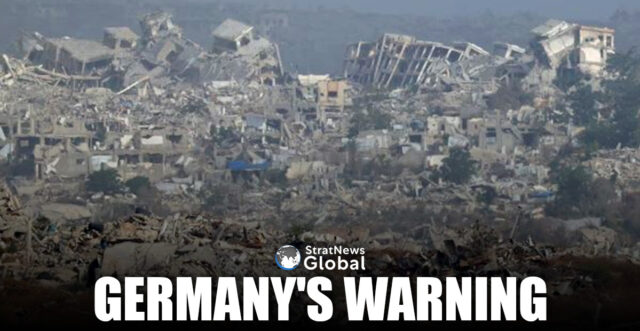Germany’s foreign minister on Tuesday warned of possible actions against Israel and stated that Berlin would not supply weapons that violate humanitarian law. The statement, along with remarks from Chancellor Friedrich Merz, marked Germany’s strongest criticism of Israel so far regarding the situation in Gaza.
Germany, along with the United States, had long remained in support of Israel’s conduct since the October 7, 2023 attacks by Hamas, even as Israel became increasingly isolated internationally. Its about-turn comes as the European Union is reviewing its Israel policy and Britain, France and Canada also threatened “concrete actions” over Gaza.
Speaking to broadcaster WDR, Foreign Minister Johann Wadephul warned Germany’s historic support for Israel must not be instrumentalised, as massive air strikes and shortages of food and medicines had made the situation in Gaza “unbearable”.
Earlier, Merz criticised air strikes on Gaza as no longer justified by the need to fight Hamas and “no longer comprehensible”, in comments at a press conference in Finland.
While not a complete rupture, the shift in tone is significant in a country whose leadership follows a policy of special responsibility for Israel, known as the Staatsraeson, due to the legacy of the Nazi Holocaust.
Public Opinion
It also reflects a broader shift in German public opinion.
“Our committed fight against anti-Semitism and our full support for the right to exist and the security of the state of Israel must not be instrumentalised for the conflict and the warfare currently being waged in the Gaza Strip,” Wadephul said.
“We are now at a point where we have to think very carefully about what further steps to take,” he said, without giving further details.
“Where we see dangers of harm, we will of course intervene and certainly not supply weapons so that there will be further harm,” he said, adding that no new weapons orders were currently under consideration.
The shift in government stance comes after calls among the junior coalition partner, the Social Democrats, to halt arms exports to Israel or else risk what the move’s backers say would be German complicity in war crimes.
Worsening Hunger
Attacks on Gaza killed dozens in recent days, and the population of more than 2 million faces worsening hunger and starvation, according to a U.N.-backed monitor.
Efforts to revive a short-lived ceasefire that broke down in March have made little visible progress, although one regional diplomat said talks were still going on in Doha and there remained a chance for a deal.
The German comments are particularly striking given that Merz won elections in February promising to host Israeli Prime Minister Benjamin Netanyahu on German soil in defiance of an arrest warrant by the International Criminal Court (ICC).
“The massive military strikes by the Israelis in the Gaza Strip no longer reveal any logic to me – how they serve the goal of confronting terror,” Merz said in Turku, Finland.
He did not reply to a question about German weapons exports to Israel. Wadephul said arms deliveries were a matter for a security council presided over by Merz, whose meetings are confidential.
The foreign ministry did not immediately reply to a further request for comment on whether Germany’s next step could include halting weapons shipments.
The chancellor is due to speak to Netanyahu this week.
In his office, Merz has a picture of Zikim beach, where Hamas fighters arrived on boats during their rampage in 2023 that killed around 1,200 people – a picture he had hanging for years previously in his parliamentary office.
Israel’s ambassador to Berlin, Ron Prosor, acknowledged German concerns on Tuesday but made no commitments.
“When Friedrich Merz raises this criticism of Israel, we listen very carefully because he is a friend,” Prosor told the ZDF broadcaster.
Merz’s comments come on top of a groundswell of opposition to Israel’s actions. A survey by Civey, published in the Tagesspiegel newspaper this week, showed 51% of Germans opposed weapons exports to Israel.
More broadly, only 36% of people in Germany view Israel positively, a survey by the Bertelsmann Foundation found in May, down from 46% in the last survey in 2021.
Only a quarter of Germans recognise a special responsibility towards the state of Israel, while 64% of Israelis believe Germany has a special obligation, the survey found.
(With inputs from Reuters)





